Some of the best greens powders on the market
To help you out, we’ve rounded up four of the best options available:
1. Garden of Life, RAW Protein & Greens, Organic Plant Formula
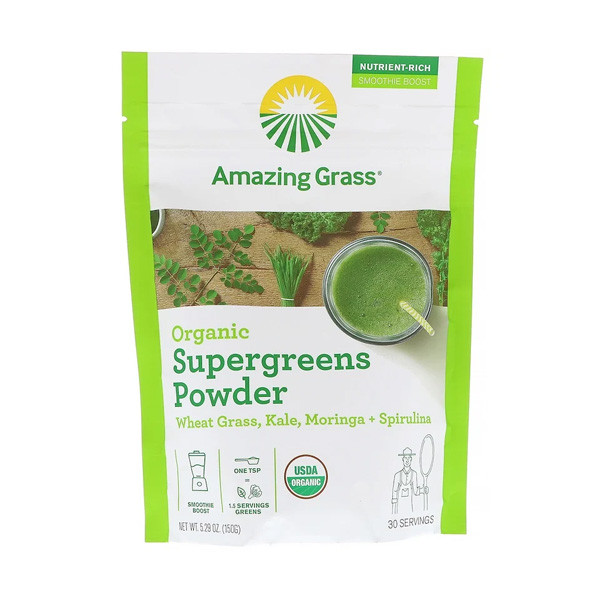
2. Dr. Mercola, Organic Fermented Greens
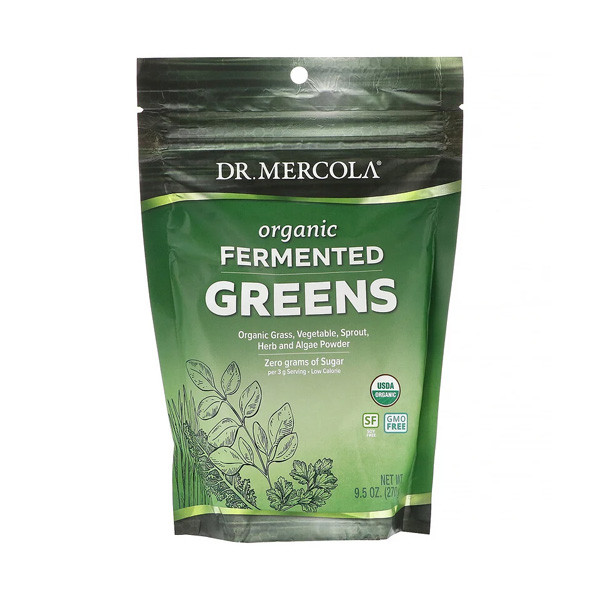
3. Amazing Grass, Organic SuperGreens Powder
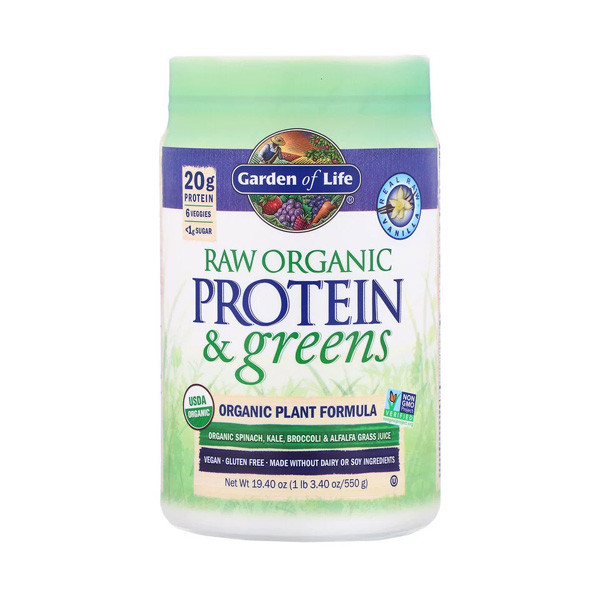
4. Amazing Grass, Raw Reserve, Ultra Premium Greens
This powder combines a bunch of organic ingredients with high nutritional quality. As well as offering a significant 25 billion probiotics to support gut health, it also contains a small amount of protein and fibre, to support satiety and digestion. It contains no added sugars, and all the ingredients are identifiable and valuable.
What are green powders?
Greens powders are all the rage these days, designed to help you reach your daily recommended vegetable and nutrient intake quickly and conveniently. Given your demanding training schedules and recovery needs, athletes require a greater quantity and variety of nutrients than those living a sedentary lifestyle, so greens powders are becoming increasingly popular amongst athletes to meet these nutritional requirements.
While many dietary supplements have come and gone in popularity, greens powders seem like they’re here to stay. With claims they can support immunity, energy levels, detoxification, performance and more, do these powders really do all they promise?
Green powders, unlike other supplements, are often sold as an “all-in-one” health solution, which can often lead to confusion around what it is they’re actually useful for… In general, greens powders tend to be high in polyphenols and other vitamins with antioxidant and anti-inflammatory powders. Depending on the brand, many also contain vitamins and minerals such as Selenium, Iodine, Chromium, and vitamins A, C and K.
Common ingredients found in these powders include kale, barley grass, spirulina, chlorella, and other “superfoods”. Designed to be added to smoothies, water, or sprinkled into bowls and desserts, these powders claim to improve your nutrient intake, compensating for the fact that many Australians aren’t meeting the recommended intake of fruit, vegetables, and greens.
However several questions remain: are these vitamins contained in therapeutic doses in greens powders? Can these powders fill nutrient deficiencies and voids? Can they make up for a poor diet? How do you separate the effective from the ineffective when it comes to choosing the right greens powder?
And most importantly: are greens powders simply an example of effective marketing, capitalising on the superfood hype that dominates our society?
If you’re an athlete or highly active person, you’ll understand the importance of meeting your nutritional needs. Fuelling your body is essential for energy levels, performance and recovery – and your nutritional needs are even greater than the average sedentary person.
In fact, a 2016 study in Belgium found that athletes eating a diet rich in dark leafy greens experienced significantly improved performance and muscle fibre composition. It suggests that simple nutritional supplementation with the key nutrients found in greens – like greens powders! – may boost exercise performance of athletes, as well as supporting overall health.
What are the benefits of greens powders?
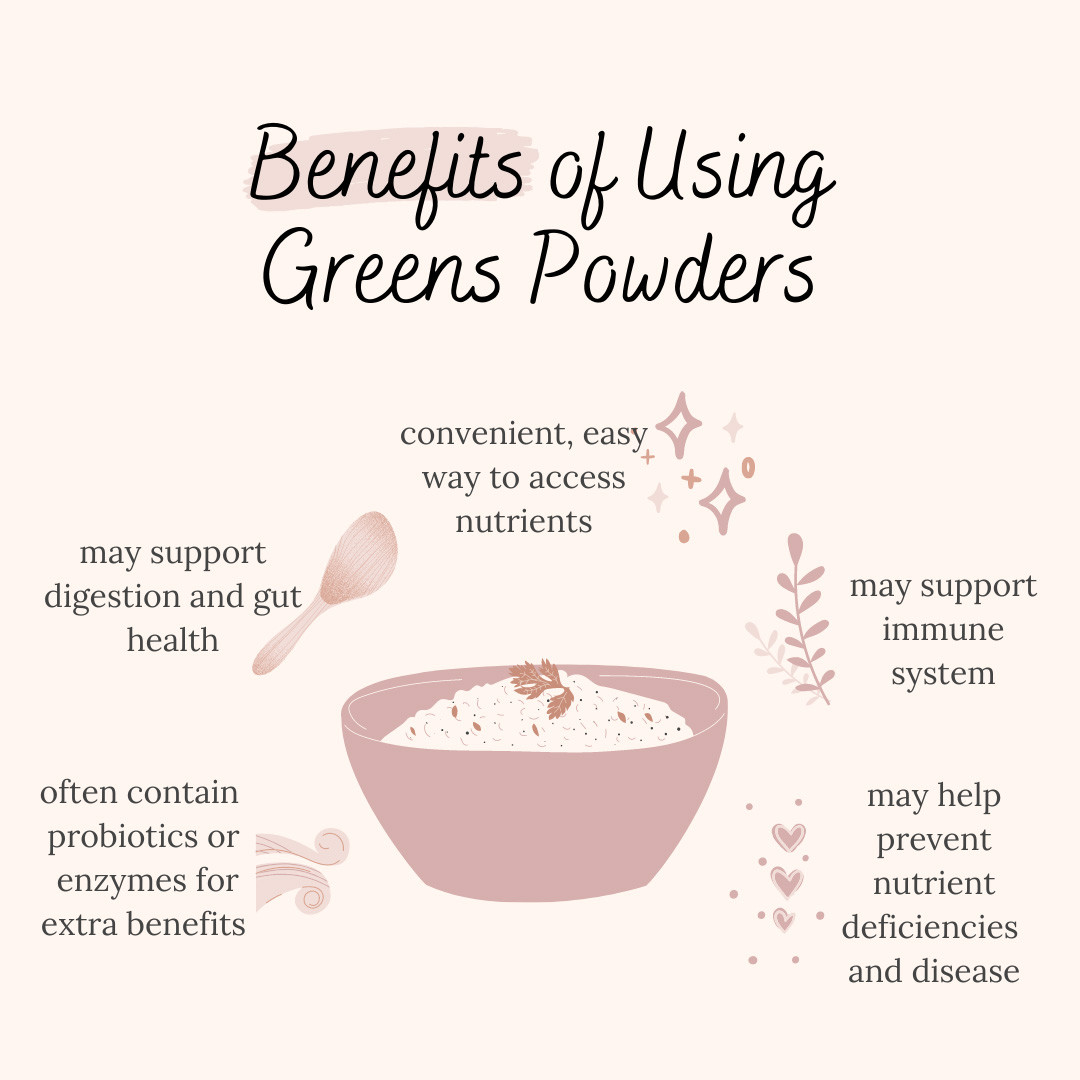
We know that good nutrition is essential for good health, with the right nutrients supporting your body to function at its best – particularly important if you’re an athlete putting extra pressure on your body with a demanding training schedule. Nutrient deficiencies, however, can lead to diseases and compromised functions. Athletes, in particular, require a significant variety of fruit and vegetables to be included in your daily diet in order to support exercise performance, function and recovery, as well as whole grains, fibre, high protein intake and healthy fats. Greens powders promise a convenient way of ingesting more of these micronutrients to prevent nutrient deficiencies and support optimal health and activity.
So the greatest benefit of using a greens powder: convenience and ease, particularly if you’re an athlete struggling to meet the increased demands of your body.
Given you’re likely to find plenty of B, A, K and C vitamins in greens powders, as well as antioxidants and anti-inflammatory compounds, these powders can support overall health and immune function – when used alongside a healthy diet and lifestyle. The anti-inflammatory benefits may also reduce your risk of disease by supporting your immune system health, and promote longevity and reduced risk of injury for athletes.
Depending on the powder you opt for, some may contain pre or probiotics to support gut and digestive health.
Others may contain ingredients such as green tea extract. A study published in the Chinese Medicine journal in 2010 suggested that green tea extract may have beneficial effects on blood sugar levels, weight loss, metabolism and disease prevention. It was also shown to enhance energy levels, making it a popular ingredient amongst athletes.
It is clear that the benefits of greens powders are specific to the brand and ingredients contained in each blend – as well as the amount of each ingredient in the powder.
Remember, if an ingredient is added to the blend in a microscopic amount, chances are it’s been placed there for marketing purposes, and won’t have a significant impact on your health!
Further studies are required to confirm the potential benefits of greens powders, both generally and individually, however there is some suggestion that they may assist with energy levels, meeting nutrient requirements and preventing deficiencies, and lowering the risk of chronic diseases, and therefore can definitely have a place in your daily diet if you’re an athlete looking to support your training, performance and overall health.
The Downsides to Greens Powders
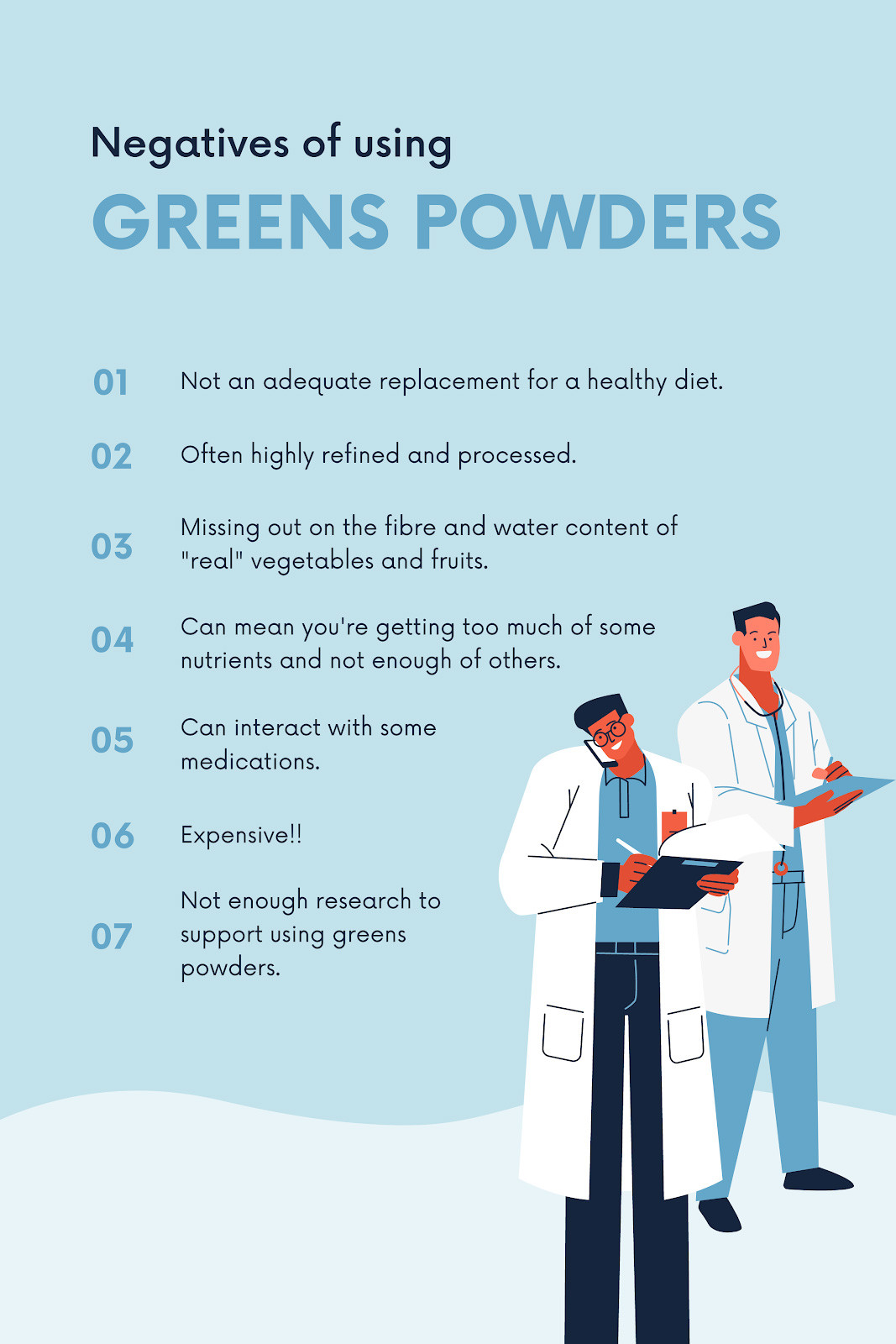
Given that greens powders are commonly marketed as “superfoods”, many people turn to these supplements to make up for a poor diet, or to meet all their nutrient requirements – particularly if you’re an athlete struggling to pack in the additional vegetables and nutrients your demanding training routine demands.
While greens powders can help support your micronutrient intake, they aren’t an adequate replacement for a healthy diet including a variety of different plant-based foods.
You have to keep in mind, while these powders might be green and highly appealing, and come with the promise of fuelling your training and performance, they are still highly refined products. The processing involved in making these supplements means they lack the water content that whole food fruits and vegetables contain, and instead often include natural sugar substitutes to improve the flavour of the powder itself – leaving you with a highly refined end product. The processing itself can also significantly lower the nutrient value of the ingredients, meaning they’re providing less energy and performance support than you’ve been led to believe.
While greens powders can provide some nutrients, they also lack fibre. When you opt for whole foods as your primary source of nutrients, you end up eating a significant amount of natural fibre in the process. Plant foods like sweet potato, beans and legumes are all rich in nutrients and fibre, and this fibre feeds your beneficial gut bugs, supporting your gut health and digestion, and allowing you to feel fuller for longer. Fibre is particularly important for athletes to get enough of, to support satiety and digestion. By relying solely on greens powders, you’re missing out on this valuable nutrient, as well as the satiating factor that comes with eating “real” foods.
Relying too heavily on a greens powder can also mean you’re not actually meeting your nutrient requirements – despite the fact you feel like you’re killing the game! Remember, many of these powders don’t contain enough of certain nutrients and minerals to meet your body’s needs, particularly the increased needs of an athlete, so if the powder is your only means of nutritional support, you’re actually likely to be lacking in important nutrients.
And on the other hand, sometimes they contain too much of some nutrients and minerals, or simply make it easy to go overboard. Think about it – if you find a fabulous greens powder that makes you feel like you’re healthy and glowing, you’re more inclined to add it to food or drinks several times a day… Now remember, there is such a thing as too much of a good thing! Consuming excessive amounts of some nutrients such as Vitamin A is just as problematic as not consuming enough! For example, too much Vitamin A can lead to toxicity in the body and even skin discolouration.
Greens powders which have high amounts of Vitamin K may interact with some medications such as blood thinners, and some may contain harmful contaminants or chemicals. Children, and pregnant or breastfeeding women should also avoid these powders, as they often contain ingredients or concentrates which can pose potential risks or harm. If you’re taking other supplements or vitamins to support your training and performance, you should definitely check for interactions with your GP before starting a new greens powder. Clearly, they’re not for everyone!
Plus, they come with a hefty price tag! When you compare these often exorbitantly priced supplements to their whole food counterparts, the price difference is significant…That’s the power of marketing superfoods for you!
The main concern, however, is this: there’s simply not enough research to confirm that forking out excessive amounts of money is worthwhile. Yet the evidence supporting a diet rich in whole foods, and real fruits and veggies is abundant – this has been proven to support performance and recovery in athletes, so you may not need the powders after all.
Are Greens Powders for You?
Now you know the truth about the positives and negatives of greens powders, one question remains: should you add one to YOUR diet?
Even though these powders aren’t the “superfoods” they claim to be, they can still have a place in a healthy and balanced diet.
If you’re struggling to get in your required vegetable intake, or have higher nutrient needs due to illness, a demanding training schedule, or other conditions, greens powers can help you meet your body’s needs. While they aren’t a replacement for eating the minimum five servings of vegetables and some fruit each day, they can provide some extra nourishment and micronutrients if you have a specific need of this.
Common Ingredients found in Greens Powders
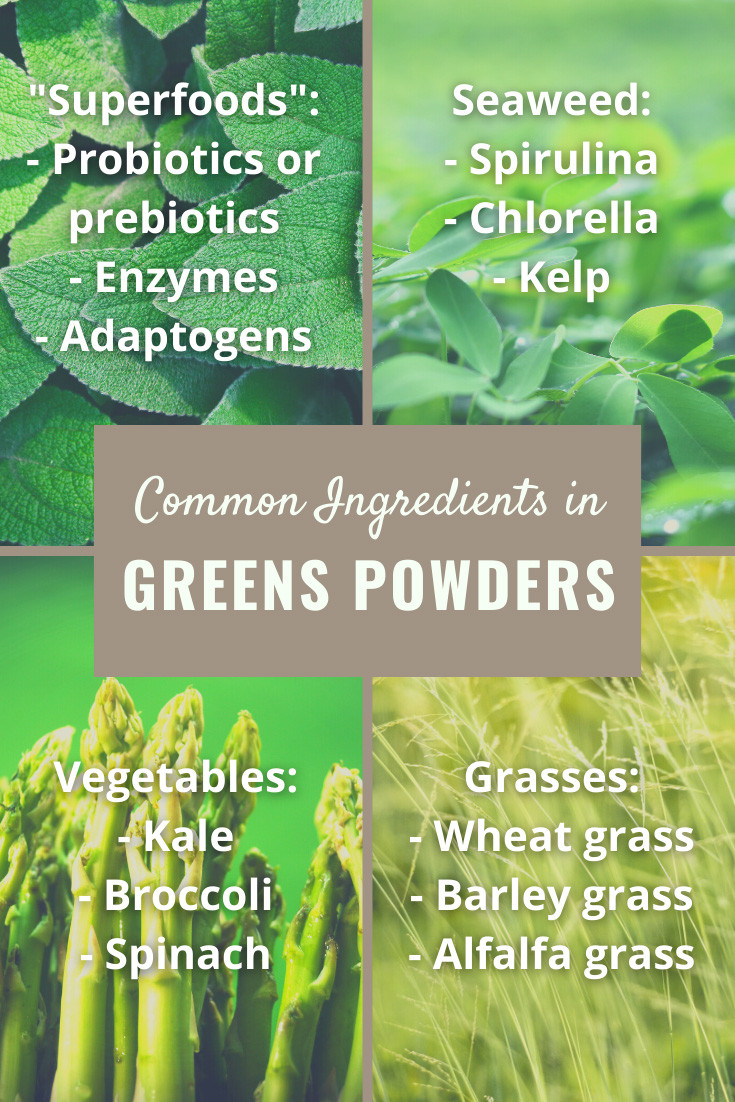
If you’re going to incorporate a greens powder into your diet, it’s important to choose one with high-quality ingredients.
While the specific ingredients of each greens powder will vary by brand and formula, they all tend to contain dried leafy greens, as well as added “goodies” or nutrients such as probiotics, digestive enzymes, seaweed, grasses, fruits and herbs.
Common variants of these ingredients include:
- Leafy greens: kale, spinach, parsley, broccoli
- Grasses: wheatgrass, barley grass
- Seaweeds: spirulina, chlorella, nori, kelp
- Other fruits/veg: banana, acai berries, goji berries
- “Superfood” extracts: green tea/coffee extract, matcha, adaptogens, probiotics, prebiotic fibres, digestive enzymes
- Nuts/seeds: flax seeds, chia seeds
- Natural sugars: stevia, monk fruit
- Fibre: inulin, apple fibre
What should you look for?
Despite the fact that many of these powders contain variants of similar ingredients, they are not all the same! There are significant differences in nutritional value and quality between powders… It’s important to look out for a few things when choosing the right greens powder to support your nutrient needs.
Most powders contain a similar amount of carbs, protein and fat, so your main focus should be the ingredients list. You want to look for a powder with as few ingredients as possible – and you should be able to recognise everything on the list!
When it comes to quality, the extraction process and the quality of ingredients is another important consideration. Look for products that are grown organically, or chemical-free, as well as those that contain cold-pressed ingredients (instead of juiced) to maintain as much nutritional value as possible.
Do Greens Powders Really Work?
The bottom line is this: while greens powders can be a helpful and convenient way of supplementing your diet and filling nutritional voids, they are absolutely not a replacement for a balanced, healthy diet and lifestyle. Greens powders cannot replace actual fruit and vegetables, and should only be used in conjunction for additional support – keeping in mind that some formulations and brands are much more effective and beneficial than others!
While these powders can give you a false sense of security, making you believe it’s okay if you don’t eat your vegetables, or it’s possible to out-supplement a poor diet, this simply isn’t the case. Caution should always be exercised when choosing a powder, to ensure it’s right for you and your nutritional needs, is minimally processed, and contains effective ingredients in adequate quantities to support your physically active lifestyle and increased nutritional requirements – otherwise you’re simply wasting your money on marketing hype.




